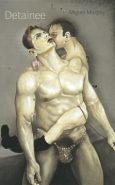
Book Review: Detainee by Miguel Murphy
Reviewed by Stephanie Barbé Hammer

Detainee
Poems by Miguel Murphy
Barrow Street Press, April 2016
$20.95; 72 pp.
ISBN-13: 978-0997318401
Can poetry simultaneously terrify and entrance? Can there be a lyricism that dramatizes horror, gives voice to continual fear, and yet also signals desire? What is the relationship between trauma and libido? Miguel Murphy raises these questions in Detainee, an assemblage of fascinating and uncompromising poems. Placing the body at the intersection of interrogation and ecstasy, poems like “Like Beauty” verbally enact how procedures of policing and incarceration have become inextricably tied to the procedures of seduction:
to hear ourselves dying
forcing the ahs
moaning the insults
of subjugation admit it
beating deliberately our tied hands
& sucking the blue memory
of sea salt from our lips you & I
The wreckage of beingsafe from gunfire
like the special-ops POW
they’re interviewing now admit it
Arresting in all senses of the word, Detainee is not a collection for the faint of heart and may be triggering for some readers. At times, this reviewer found herself gazing at the collection as if contemplating the spectacle of an ever-unfolding accident, as “Celibate,” a poem about a child’s murder, makes clear:
Broken
like she was, like a wing
draped awkwardly over the poor
swollen body of her son. Leave
and stay. Leave
and stay.
This shuddering paradox—leave/stay—perfectly encapsulates the reading experience of this collection and the push-pull of the poems, which draw us in as they tear us, and the speaker, and everyone else, apart.
Yet, for some at least, the pain may be part of the pleasure, as the speaker in “A Morbid Education” slyly notes in the second half of the collection:” Don’t you wish every nightmare knifed / like this? Pleasure raising / the red welt?”
How ironic that Murphy uses the ubiquitous non-form we know as free verse to talk about everything that is not freedom: from being transported illegally in the trunk of a car to orchestrating the carefully controlled rituals of BDSM. The point for Murphy is to decipher and force us to plumb the darkness and complexity of our own humanness. “Beings in hunger” the poet calls us at one point. And after all, isn’t that perilous journey into the unknown and forbidden precisely what we sign up for when we read poetry in the first place? If so, then we have to agree with Murphy’s lyrical command: “Weep, disaster. I wanted you.”
Stephanie Barbé Hammer is Professor Emerita of Comparative Literature at the University of California, Riverside. She is the author of three scholarly books, a prose poem chapbook, a poetry collection, and a novel. An award-winning educator, Stephanie teaches creative writing at non-profits, community colleges, and online. She is currently working on a novel about fangirls, right-to-lifers, and suicides as well as a poetry collection about trying to deal with nature when you’re from Manhattan.

Leave a Reply